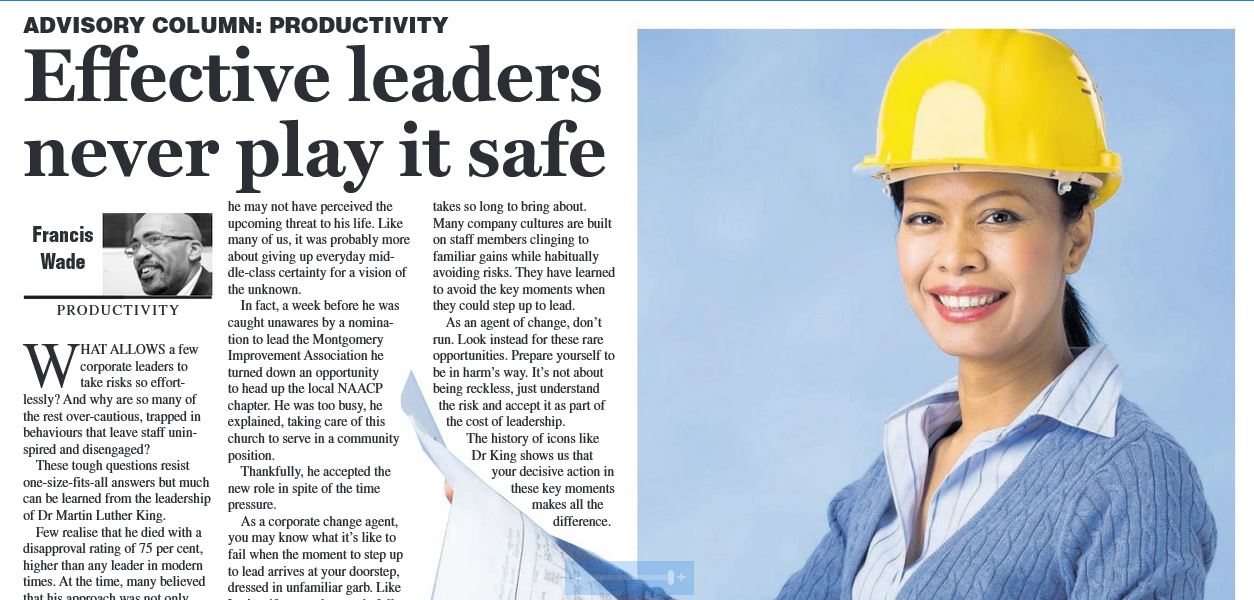What allows a few corporate leaders to take risks so effortlessly? And why are so many of them over-cautious, trapped in behaviors that leave staff uninspired and disengaged? These tough questions resist one-size-fits-all answers but much can be learned from the leadership of Dr. Martin Luther King.
Few realize that he died with a disapproval rating of 75%, higher than any leader in modern times. At the time, many believed that his approach was not only wrong, but unnecessary. As a result, according to those close to him, he became increasingly disillusioned inside, but to outsiders, he just kept moving. He continued to put himself at physical risk, and today Americans revere him with a 90%+ approval rating.
However, King’s example isn’t only for CEO’s and Managing Directors. In fact, anyone at who who wants to make a difference must face similar challenges, regardless of their level. Here are two ways to remain motivated as a change agent in your company.
Fleeing Familiarity and Safety
Anyone who is inspired with the ability to see a shiny new vision is cursed by their good fortune. Why? Inspirational feelings soon wear off, revealing an opposing force which feeds on fear and pulls them backwards. It represents the familiar parts of their lives, the routines to which they have become accustomed, the comforts they have embraced. These were all-important right up until the moment when that new vision disrupted everything.
King was no different. He was living a comfortable, middle-class life as a pastor of a church and a father of young children when he was recruited as a spokesman for the Montgomery Bus Boycott in 1955. He was 26-years old.
Over the objections of others, he steadily abandoned the path other ministers in his circles had followed. This brought him into a sustained, dangerous confrontation with enemies intent on destroying his work and personhood.
However, at the very beginning he may not have perceived the upcoming threat to his life. Like many of us, it was probably more about giving up everyday middle-class certainty for a vision of the unknown.
In fact, a week before he was caught unawares by a nomination to lead the Montgomery Improvement Association he turned down an opportunity to head up the local NAACP chapter. He was too busy, he explained, taking care of this church to serve in a community position.
Thankfully, he accepted the new role in spite of the time pressure.
As a corporate change agent, you may know what it’s like to fail when the moment to step up to lead arrives at your doorstep, dressed in unfamiliar garb. Like Lot’s wife, you glance wistfully back at the fruits of your hard work, afraid to lose them. It pays to look ahead. Here’s why.
Being Willing to Be in Harm’s Way
As a first-time manager you may have been shocked to discover that the easy life you imagined after being promoted doesn’t exist. Now, you find yourself in harm’s way: the subject of criticism from employees below and executives above.
But it’s just the beginning. With every promotion it only gets worse: the risk increases, takes on new forms and arises in ways you never thought possible.
Seasoned executives will tell you that their perks pale in comparison to sleepless nights, undeserved attacks and targeted gossip that comes from any move into the limelight. They also share that leadership is about accepting such uncertainty, while consciously putting oneself in harm’s way. In other words, it’s a bad idea for the employee who has learned how to avoid risks at all costs.
Even King admitted that if he had been given time to think about becoming the leader of the new organization, he would have declined. It was a decision made in response to the moment.
Yet, we only understand it as a momentous decision in hindsight. In that critical occasion, the choice before him was similar to the ones you face each day. Like every other chance to lead, it eventually passes and life goes on, but the difference that you could have made is lost; sometimes forever.
Take this example and multiply it a few hundred time to get an idea of why change in your firm takes so long to bring about. Many company cultures are built on staff members clinging to familiar gains while avoiding risks at all costs. People learn to avoid the key moments when they could step up to lead.
As an agent of change, don’t run: look for these rare opportunities. Prepare yourself to be in harm’s way. It’s not about being reckless, just understand the risk and accept it as part of the cost of leadership. The history of leaders like Dr. King shows us that your decisive action in these key moments makes all the difference.

